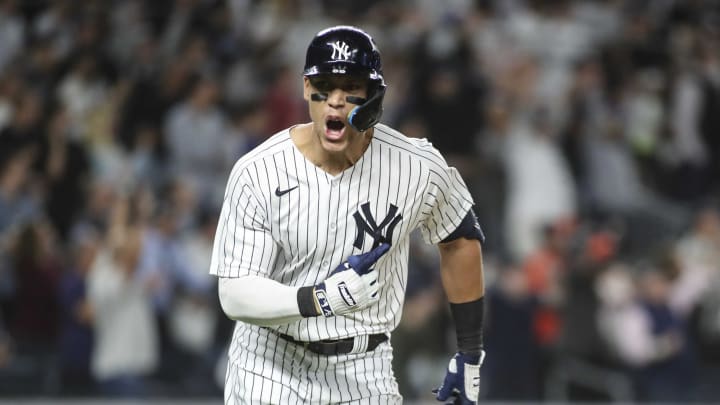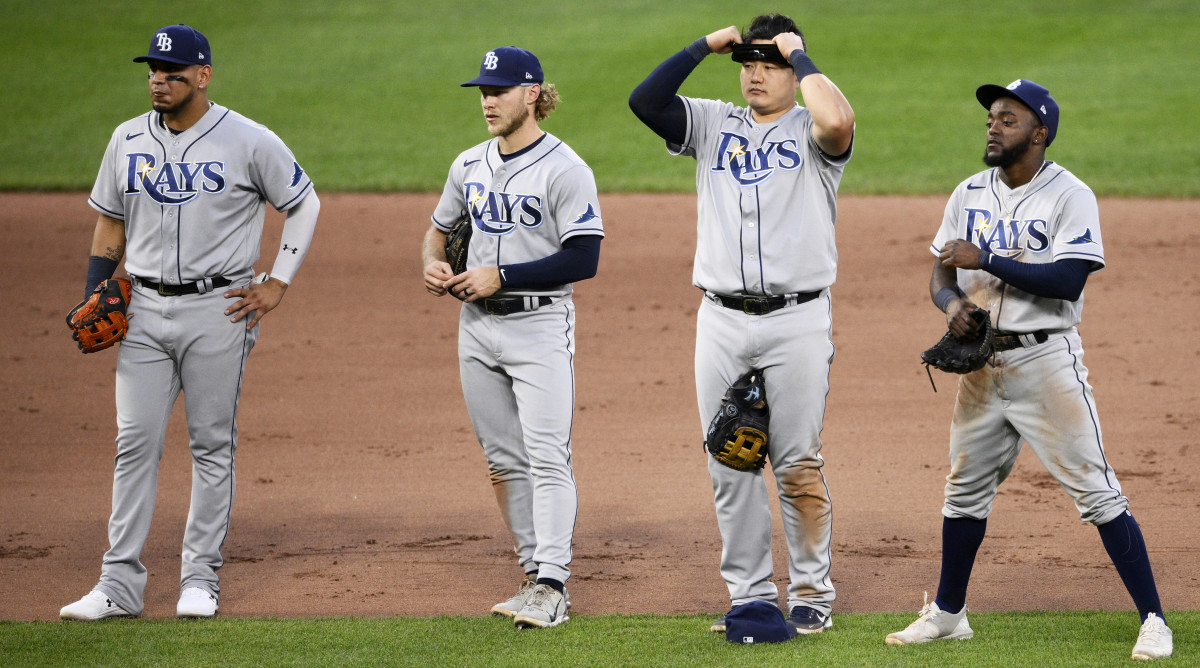Aaron Judge and the Yankees Find a Compromise

Aaron Judge’s contract year is one of the defining story lines of this season, and last night, he made his latest case for why the Yankees should pay him whatever the heck he wants to spend the rest of his career in pinstripes.
With two on, two out and the game tied in the bottom of the ninth inning against the Astros, Judge ripped a single into the left field corner to drive in the winning run. It was his second walk-off hit of the season—he also crushed a three-run homer to beat the Blue Jays on May 10—and New York’s ninth walk-off win.
Adding to the narrative, of course, was that Judge’s arbitration hearing with the Yankees was scheduled for today at noon ET. The dispute was over how much money the team will pay him this season. New York offered $17 million; Judge asked for $21 million. This hearing would have taken place during the offseason if not for the MLB lockout, so the arbitrator would not have been permitted to consider anything Judge has done this season in deciding the case.

But, in an unexpected development this afternoon, shortly after the hearing was supposed to begin, the New York Post’s Jon Heyman reported that the Yankees and Judge had settled and that there would not be a hearing today. MLB.com’s Mark Feinsand then reported the two sides met at the midpoint; Judge will make $19 million this season, plus incentives.
The two sides avoided a hearing that would have put them at odds just a few months before Judge’s contract is set to expire. The nature of these hearings is both awkward and contentious. The team tries to convince an arbitrator that the player is not worth the salary he is seeking. To do so, the club uses a player’s weaknesses as evidence to support its argument, and thereby insults the player. It’s one thing to do this with a player in his first year of arbitration who isn’t quite yet a star; it’s entirely different when the player is on pace to hit 62 home runs in his contract year and is one of MLB’s most recognizable stars. If he feels disrespected, he could choose to sign with a different team, one that will pay him what he thinks he deserves. It would have been utterly ridiculous for the Yankees, a franchise worth about $6 billion, to risk alienating Judge just to save $4 million. It seems they came to their senses just in time, though maybe things would have been different had Judge not met them halfway.
There are a few other possible reasons for why the Yankees and Judge settled instead of going to arbitration. First, maybe neither side was certain that the arbitrator would rule in their favor. For the team, dissing your superstar becomes even more pointless if, in the end, you lose the case. For the player, $19 million looks pretty good if there’s a chance that, after the hearing, you’ll get only $17 million. Also, both sides could have felt it was in neither of their best interests to enter into a dispute that could disrupt Judge’s on-field performance and therefore hurt the team’s chances of winning.
It’s worth noting that just because they settled here doesn’t mean Judge is going to be back with the Yankees next season. His salary this year is small potatoes compared to the mega-contract he’ll sign in the offseason.
Remember, just before the season started, Judge rejected the Yankees’ seven-year, $213.5 million extension offer, which would’ve begun next season. That was reasonable for an extension offer; his $30.5 million average annual value would’ve been slightly higher than the $30.4 million AAV that the Dodgers gave Mookie Betts in his 12-year, $365 million extension. But, as Tom Verducci wrote in his column at the time about Judge’s big bet on himself, “If Judge wants to maximize his value, however, the tool to do that is free agency. Eight of the 12 highest AAVs in baseball history resulted from the leverage of free agency.”
On Opening Day, general manager Brian Cashman revealed the details of the final extension offer that Judge rejected in a pre-game press conference. Judge didn’t seem too pleased with Cashman publicly disclosing information that usually only gets out through anonymous sources.
“At the end of the year, I’m a free agent now,” Judge told reporters at the time. “Talk to 30 teams. The Yankees will be one of those 30 teams.”
Judge has said he wants to spend his entire career with the Yankees. Maybe that matters more to him than what is said, both publicly and in private, during contract negotiations. Maybe the pull of being the biggest star on the best team in baseball is enough of a reason for him to re-sign, so long as the Yankees pay up, no matter how rocky things get before his contract expires.
Today, Judge and the Yankees avoided a conflict that could have impacted his future with the organization. Next time, the stakes will be much higher.
Have any questions for our team? Send a note to mlb@si.com.
1. THE OPENER

“Over the past few years, one way to watch the future of baseball has been to watch the present of the Rays…
“And if you watch closely in about six weeks, you might yet again learn something. With the Yankees 12.5 games ahead in the American League East and looking like they might win 120, the Rays must decide how to treat the trade deadline. Under the new, 12-team playoff system, the top two division-winners in each league receive a first-round bye; the other division winner and three wild card teams play a three-game wild card series.
“We are about to find out how smart organizations value the wild card slots.”
That’s how Stephanie Apstein begins her column this morning about the precarious position the Rays are in right now, and what it means for the future of the game under the new 12-team playoff format. You can read her entire piece below.
The Rays Need Front Office Creativity Once Again to Make the Playoffs by Stephanie Apstein
Tampa Bay has a new problem to solve: how to value the expanded-playoff slots.
2. ICYMI
Let’s run through some of our other great SI baseball stories from this week.
MLB Can’t Replace the Mud Man So Easily by Emma Baccellieri
The league is trying to find another method for preparing baseballs, but Jim Bintliff’s secret sauce remains the only viable option.
Six Takeaways on MLB’s First All-Star Fan Voting Update by Will Laws
For the most part, the fans got it right, but there were still a few snubs in the results released on Tuesday.
Oneil Cruz Gives the Pirates Hope for a Brighter, More Fun Future by Nick Selbe
In his much-anticipated season debut on Monday night, the 23-year-old star prospect faced the tall task of living up to the hype. He did not disappoint.
This Is Paul Goldschmidt’s Goldy Hour by Tom Verducci
The 34-year-old St. Louis slugger is the best hitter in the National League. A two-time MVP runner-up, he just might become the oldest MVP (non-juiced version) since Mike Schmidt 36 years ago.
3. WORTH NOTING from Tom Verducci
MLB released its first update on All-Star voting this week: Not a whole lot of surprises there. (Would you believe a lot of people have noticed this is a great season for Aaron Judge?) But I wanted to zero in on the closest race—for the best third baseman in the American League. As of Tuesday, Rafael Devers (727,669 votes) had a narrow lead over José Ramírez (711,367).
There’s a fair case to be made for either. Ramírez leads in OPS+ (189 to Devers’ 167), with a higher on-base percentage and slugging, though Devers leads in average. Devers has the edge with defense; Ramírez has speed. The defensive gap (or, at least, what we have from defensive metrics at this point in the season) means that Devers leads in WAR at both Baseball Reference (3.8 to 3.5) and FanGraphs (4.0 to 3.9). All of which is to say… it’s really, really, really close. Personally? I’m a sucker for the power-speed combo you get from Ramírez—no one else in baseball has more than 15 home runs and 10 steals!—but you can’t go wrong.
4. W2W4 from Nick Selbe
The last two National League pennants have been decided between the Braves and Dodgers, with the winner eventually hoisting the World Series trophy. The two teams will square off this weekend for the second time in 2022, this time in Atlanta, where the Braves went 3-0 at Truist Park in last year’s NLCS and clinched their first World Series berth in 22 years. The return of Freddie Freeman to Atlanta is the headliner, but Sunday’s projected pitching matchup between ERA leader Tony Gonsolin and the flame-throwing, mustachioed Spencer Strider is worth tuning in for as well.
Meanwhile, the top two teams in the American League are tangling in the Bronx, with the Yankees hosting the Astros. New York has lost just one series since mid-April, and is off to a historic pace. Houston has beaten the Yankees in the ALCS twice over the past five years, and we could be in store for a third meeting between the two come October.
5. THE CLOSER from Emma Baccellieri
It feels almost incomprehensible that there is still room to be impressed by Shohei Ohtani—after his incredible, paradigm-shifting performance last year, there should be no space left for surprise. And yet! He had eight RBIs (at the plate) on Tuesday, 10 strikeouts (on the mound) on Wednesday, back-to-back days with numbers that only one other player has ever done in an entire career. (Nope, it’s not Babe Ruth: While he had 10 or more strikeouts as a pitcher twice, he never had more than seven RBIs as a hitter. The answer is Tony Cloninger.) To do this at all is wild. To do it one day after the next—just another week in the life of Ohtani? What a gift to be able to watch, and what a delight to have room for more surprises.
That’s all from us today. We’ll be back in your inbox next Friday. In the meantime, share this newsletter with your friends and family, and tell them to sign up at SI.com/newsletters. If you have any questions or comments, shoot us an email at mlb@si.com.
